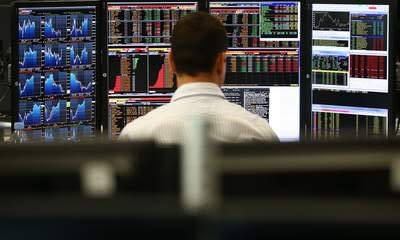FTSE Below 6,000 Barrier As Oil Hits $37

The FTSE 100 has joined other global stock markets in bleeding value, with investors fleeing commodities as oil prices tumble further and a US interest rate hike looms.
London's premier share index shed 135 points or 2.2% during trading on Friday, to close at 5,952.
It (Other OTC: ITGL - news) equated to a loss, in value terms, of £34bn on Friday alone following a week of woe that saw the FTSE lose ground each day - spelling further bad news for pension pots and other investments.
All eyes were on Brent crude , which fell as much as 4.5% during afternoon trading to $37.9 a barrel - driven by an International Energy Agency prediction that the record glut in oil stocks could last until late next year.
Investors were also looking ahead to next week, when the US Federal Reserve (Fed) is widely expected to raise interest rates for the first time in nine years despite international concerns about the impact.
Such a move would likely strengthen the dollar further and depress the cost of commodities, such as oil, even more as they are priced in dollars.
Another knock-on effect would be to raise the cost of servicing the debts of many emerging market economies - denting their growth efforts.
The FTSE fallers were dominated by their exposure to commodities in the mining-heavy index but were actually led by the asset management firm, Old Mutual (Other OTC: ODMTY - news) .
It lost more than 10% of its value for the second day running on the back of political turmoil in South Africa, where much of its business is based.
The rand sank to a record low against the dollar after President Jacob Zuma sacked his finance minister.
There were wider fears for the global economy evident across European trading, with traders citing weakness in China's currency, the yuan.
The DAX in Germany closed 2.4% lower while in New York, the S&P 500 was 1.6% down mid-way through its final session of the week.
Stocks to suffer in London on Friday included Anglo American (LSE: AAL.L - news) , down 8.1%, and BHP Billiton (NYSE: BBL - news) which lost more than 5%.
The FTSE started the year at 6,566 and is currently 9.1% worse off.
David Buik, market commentator at Panmure Gordon, said: "Understandable correction waited in the wings in the early weeks of 2015 when oil dropped from $65 a barrel to $52.
"But then the FTSE 100, on reasonable earnings and no logical alternative asset class competition ploughed its way to a record 7104 at the end of April (LSE: 0N69.L - news) . But it never had the legs or the conviction to push on.
"Soon warning bells in the shape of distress signals affecting growth in China threatened a meltdown. Oil prices continued to recede; that rattled the market’s confidence.
"Add to that ridiculous unsubstantiated threats from the Fed to raise interest rates, which made for a very strong dollar, thus trashing emerging markets brought about a change in sentiment.
"Investors suddenly realised that stock markets were not delivering growth, triggering a fall in the FTSE 100 to 5900 in August."
He cited the "dramatic cut" in resource prices since for helping take the mining sector down by an average 65% in 2015 to date.

 Yahoo Finance
Yahoo Finance 